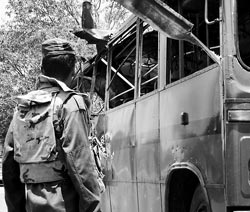
The players played out their roles and a conflict was bornConflict Resolution Lessons For Sri Lanka by G.D.C. Weerasinghe. Reviewed by Ayesha Inoon Why is there a conflict in Sri Lanka? What have been the root causes and influences – both internal and external – behind the crises we face as a country today? G.D.C Weerasinghe’s book, ‘Conflict Resolution Lessons For Sri Lanka’ attempts to answer these questions by looking back at the country’s history, the impact of international affairs and the actions of past politicians with relevance to the present situation in the country. The revised second edition of the book further includes a chapter on the operations of the Secret Services of foreign powers. Citing instances when the role of the Secret Service resulted in important victories for those countries, it underlines the necessity for the public as well as political leaders to be aware of the machinations of these institutions.
Delving into the reasons behind the dismantling of the British Empire and the granting of independence to Ceylon in 1948, the writer takes a look at the conditions that prevailed before the Second World War and its consequences, which led to the emergence of the USSR as a World Super Power. This, he says had in turn a tremendous impact on the traditional Imperial Powers such as Britain, France, Netherlands, Belgium and the neo-colonial power, the United States. To retain world control, the Imperialists had to neutralise the two most populous countries in the world – India and China. In order to continue with neo-colonial control they infiltrated the administration of these countries by so-called ‘Non Governmental Organisations’, says the writer, adding that these facts are to ‘illustrate the multi-pronged struggle that we have to wage to gain real Independence in our country economically, politically and socially.’ Events from the history of countries such as England, USA and the Soviet Union are cleverly used to illustrate how these nations continued to wield their influence over countries such as ours, and how Sri Lanka’s supposed ethnic problem demonstrates this negative influence on our sovereignty. Pointing out the caste discrimination that existed among the Sri Lankan Tamils themselves, the author further goes on to examine the claim by Tamil politicians that Tamils are discriminated against. To this end, he explains the connotations of the word ‘discrimination’ drawing examples from countries such as Turkey and Iran. ‘Tamil is an official language,’ the book states. ‘The majority of the Tamils live in the South among the Sinhalese. There is absolutely no discrimination, legally or socially.’ It is also pointed out that the 83’ riots were a breakdown of law and order which was not adequately curbed by the then Government, and not discrimination.
The primary objective of any Sri Lankan Government, stresses the writer, should be the creation of a united and cohesive national group with the combination of various ethnic groups. He describes in strong and vivid language, the many opportunities lost by past politicians to achieve this goal, as well as examples of how other countries have acted in such situations. Bringing home the reality of the current war that is being waged in the country, he urges that a more complete commitment must be made to the war since ‘War cannot be waged in half measures’. Presenting a comprehensive study of the LTTE and its leader as well as their motives, he theorises that their quest for absolute power in the regions they claim as their own, stems from the discrimination of non-Vellalar Tamils by Vellalar Tamils and the need for the former to avenge themselves. Throughout the book the author makes it clear that Imperialist Powers only act in their own interests. Is it fair, he questions, that the Western Powers who refuse to negotiate with any class of terrorists should request us to negotiate with a terrorist group that has proved its ferocity and capacity for violence? The author is a retired British-educated professional lawyer who has had an extensive legal practice both in Colombo and the outstations and is currently involved in social work. |
|| Front
Page | News | Editorial | Columns | Sports | Plus | Financial
Times | International | Mirror | TV
Times | Funday
Times || |
| |
Copyright
2007 Wijeya
Newspapers Ltd.Colombo. Sri Lanka. |

